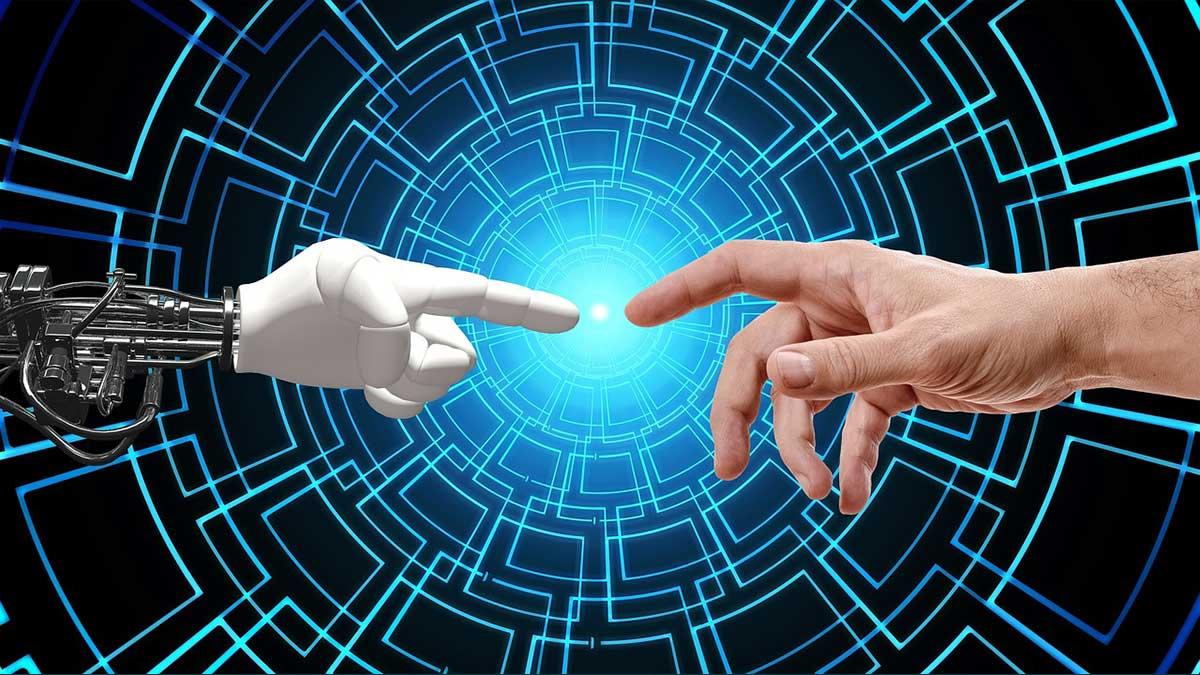AI in Indian Healthcare: Challenges and Opportunities
Economic Survey highlights challenges to AI adoption in Indian healthcare, including talent shortage, data complexity, and scaling. However, AI can bridge accessibility, affordability, and quality gaps.

Photograph: Kind courtesy Gerd Altmann/Pixabay.com
New Delhi, Jan 31 (PTI) Adoption of artificial intelligence in the Indian healthcare sector faces several challenges, including lack of specialised talent, data complexities and difficulties in scaling up, and requires attention going forward, the Economic Survey 2024-25 tabled in Parliament flagged on Friday.
The National Strategy for Artificial Intelligence (2018) developed by NITI Aayog discussed how AI could help address the challenges of quality, accessibility and affordability for a large section of the population.
The strategy emphasised how AI combined with robotics and the Internet of Medical Things (IoMT) can potentially become the 'new nervous system for healthcare', providing solutions to address healthcare problems and helping the government achieve universal health for all, the report stated.
According to NASSCOM, the widespread adoption of AI in healthcare can create new opportunities for the sector and bridge the accessibility, affordability, and quality gaps.
"Adoption of AI can help reduce drug discovery and delivery costs; it can improve the quality of medical devices, improve diagnosis accuracy and enable real-time monitoring of remote patients. For healthcare providers, AI helps streamline the overall patient journey, assists clinicians in reducing misdiagnoses, and enables personalised treatments and preventive care," the report said.
Presenting one of the use case examples of how AI can efficiently deliver services and enhance the accessibility of healthcare for citizens, the report mentioned how the Rajasthan state government has set a new benchmark in public health management of Silicosis, a debilitating lung disease caused by inhaling silica dust, which is widespread in the state due to sandstone mining activities.
The state government is effectively using digital X-rays, tele-radiology, and AI to streamline the diagnosis of Silicosis.
The technology was developed by training an AI model on a vast dataset of over-labelled chest X-rays. By leveraging AI technology, the government enabled the automatic detection of the disease, making the diagnostic process faster and more accurate, the report said.
This technology has significantly improved the identification and treatment of Silicosis patients.
The government also introduced DBT self-approval portal, which allows diagnosed patients to receive financial assistance directly into their bank accounts, bypassing the previously cumbersome administrative procedures.
This system ensures that those affected by Silicosis receive timely relief, the report stated.
Silicosis is associated with severe comorbidities such as tuberculosis, cancer, ischemic heart disease, bronchitis, and infections from bacteria and fungi.
Another example of technology integration in health care is the eSwasthya Dham portal launched by the Uttarakhand government, the report mentioned.
This portal helps monitor Char Dham Yatra pilgrims' (Yamunotri, Gangotri, Kedarnath and Badrinath) health parameters and offers a variety of benefits for pilgrims, including the ability to generate an ABHA in under two minutes.
Creating the ABHA, helps provide a reliable and secure identity for devotees, enabling them to manage their health records digitally. This system will also ensure prompt assistance for citizens in case of emergencies, the report said.
As a result, it facilitates the smooth journey of pilgrims.
"Despite its great potential, AI adoption in India is still in its early stages," the report highlighted, adding in 2023, 34 per cent of healthcare organisations in India were piloting AI projects, and 16 per cent had moved their generative AI initiatives into production.
"However, the adoption of AI in the Indian healthcare sector faces several challenges, including a lack of specialised talent (both technical and domain-specific), data complexities, and difficulties in scaling up. This requires attention going forward," the report said.
The National Strategy for Artificial Intelligence (2018) developed by NITI Aayog discussed how AI could help address the challenges of quality, accessibility and affordability for a large section of the population.
The strategy emphasised how AI combined with robotics and the Internet of Medical Things (IoMT) can potentially become the 'new nervous system for healthcare', providing solutions to address healthcare problems and helping the government achieve universal health for all, the report stated.
According to NASSCOM, the widespread adoption of AI in healthcare can create new opportunities for the sector and bridge the accessibility, affordability, and quality gaps.
"Adoption of AI can help reduce drug discovery and delivery costs; it can improve the quality of medical devices, improve diagnosis accuracy and enable real-time monitoring of remote patients. For healthcare providers, AI helps streamline the overall patient journey, assists clinicians in reducing misdiagnoses, and enables personalised treatments and preventive care," the report said.
Presenting one of the use case examples of how AI can efficiently deliver services and enhance the accessibility of healthcare for citizens, the report mentioned how the Rajasthan state government has set a new benchmark in public health management of Silicosis, a debilitating lung disease caused by inhaling silica dust, which is widespread in the state due to sandstone mining activities.
The state government is effectively using digital X-rays, tele-radiology, and AI to streamline the diagnosis of Silicosis.
The technology was developed by training an AI model on a vast dataset of over-labelled chest X-rays. By leveraging AI technology, the government enabled the automatic detection of the disease, making the diagnostic process faster and more accurate, the report said.
This technology has significantly improved the identification and treatment of Silicosis patients.
The government also introduced DBT self-approval portal, which allows diagnosed patients to receive financial assistance directly into their bank accounts, bypassing the previously cumbersome administrative procedures.
This system ensures that those affected by Silicosis receive timely relief, the report stated.
Silicosis is associated with severe comorbidities such as tuberculosis, cancer, ischemic heart disease, bronchitis, and infections from bacteria and fungi.
Another example of technology integration in health care is the eSwasthya Dham portal launched by the Uttarakhand government, the report mentioned.
This portal helps monitor Char Dham Yatra pilgrims' (Yamunotri, Gangotri, Kedarnath and Badrinath) health parameters and offers a variety of benefits for pilgrims, including the ability to generate an ABHA in under two minutes.
Creating the ABHA, helps provide a reliable and secure identity for devotees, enabling them to manage their health records digitally. This system will also ensure prompt assistance for citizens in case of emergencies, the report said.
As a result, it facilitates the smooth journey of pilgrims.
"Despite its great potential, AI adoption in India is still in its early stages," the report highlighted, adding in 2023, 34 per cent of healthcare organisations in India were piloting AI projects, and 16 per cent had moved their generative AI initiatives into production.
"However, the adoption of AI in the Indian healthcare sector faces several challenges, including a lack of specialised talent (both technical and domain-specific), data complexities, and difficulties in scaling up. This requires attention going forward," the report said.
You May Like To Read
TODAY'S MOST TRADED COMPANIES
- Company Name
- Price
- Volume
- Vodafone Idea L
- 7.18 (+ 1.13)
- 52653381
- GTL Infrastructure
- 1.49 (+ 0.68)
- 33373393
- GMR Airports
- 85.66 ( 0.00)
- 20868077
- Pradhin
- 0.49 ( 0.00)
- 16829759
- Standard Capital
- 0.49 (+ 2.08)
- 16405397







 © 2025 Rediff.com India Limited. All rights reserved.
© 2025 Rediff.com India Limited. All rights reserved.